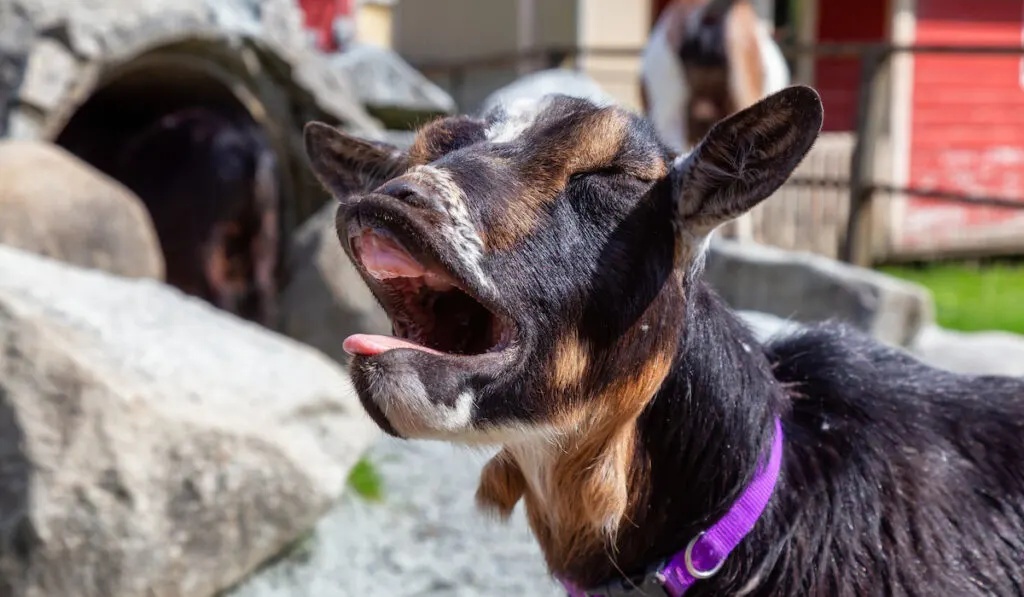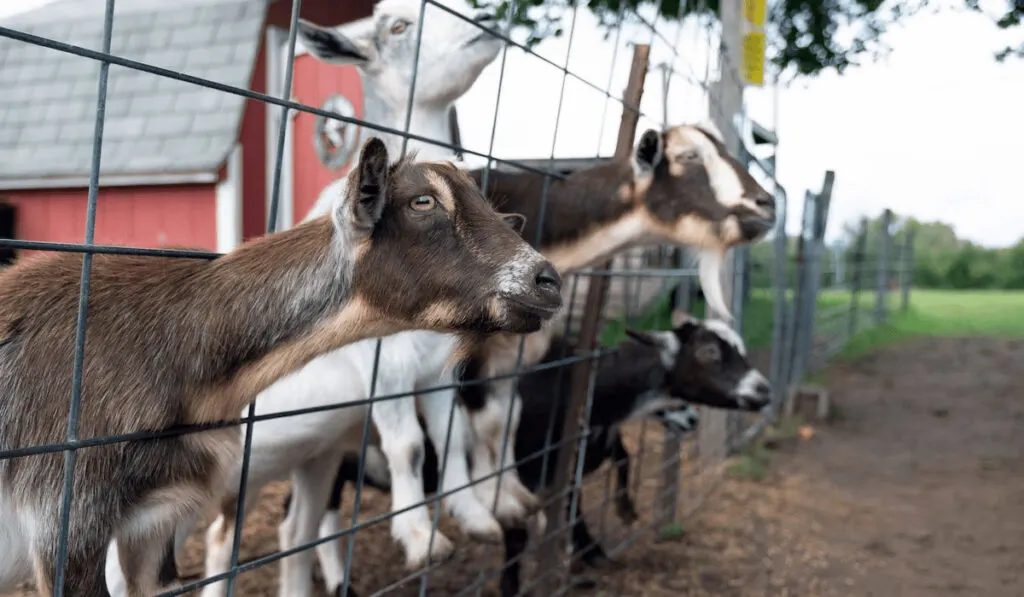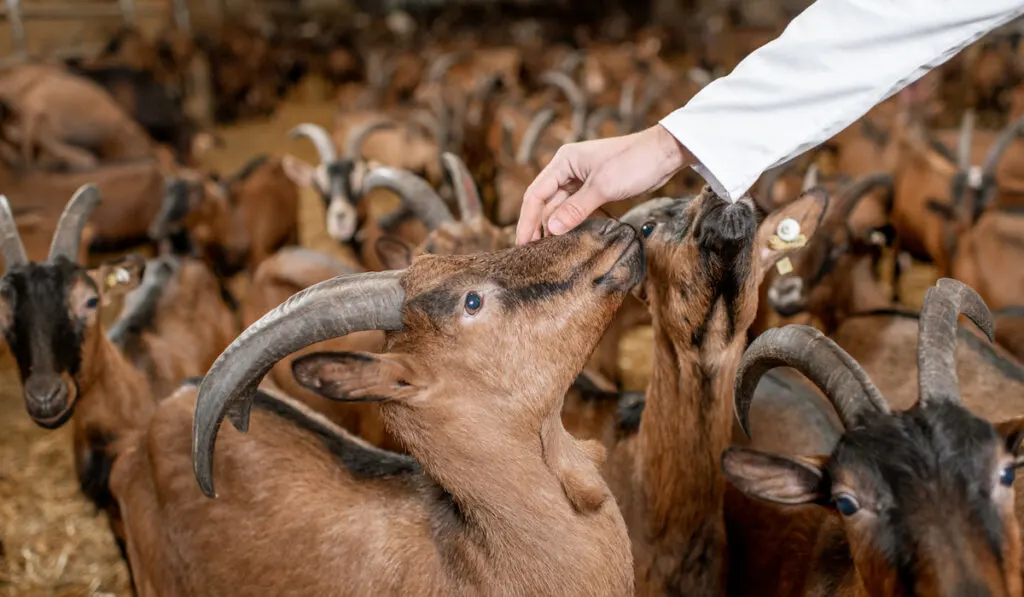Many veterinarians are faced with the phrase ‘I think that my goat has eaten poison’ or ‘I think that my goat has been exposed to poison.’
But, is goat poisoning that common? What are the things that cause poisoning and how can you recognize them? And, the most importantly, how can you prevent poisoning from occurring? After doing some research, I have some answers to these questions.

Before going deep into details, the most important thing you have to know is that if you have any suspicion that your goat may have eaten or been exposed to poison, you need to call the vet.
The points mentioned in this article are just advice to increase your awareness about the topic.
When an animal becomes ill, the first thing that may come to its owner’s mind is that it has ingested something poisonous. A
Although this is a common worry, it is something that actually happens quite rarely from a vet’s perspective.
Goats are browsing animals, so they do have ample opportunity for exposure to poisons. This poison can be a toxic plant or chemical in their environment.
Table of Contents
Signs of Poisoning in Goats
There are many signs that appear for a poisoned goat. Signs range from mild signs such as vomiting and diarrhea to severe signs such as convulsions or even death as the first presentation.
Knowing these signs is essential to recognize the problem and take the next step as soon as possible.
Here is a list of some signs of poisoning:
- Vomiting
- Diarrhea
- Loss of appetite
- Salivation and repeated swallowing
- Rapid breathing
- Lethargy
- Incoordination
- Recumbency
- Convulsions
- Death
These are not the only signs. There are many other signs that can occur with specific poisons and they will be mentioned in the next sections under individual poisons.

Exposure to Poisons
There are many ways for a goat to be poisoned, one of them is their natural instinct to browse. It becomes a real threat if the goat has been physically restricted to one area.
The prevention of the goat’s natural instinct to browse could cause it to consume a potentially harmful amount of a hazardous plant or chemical within its easy reach.
Another important point to recognize is that a goat’s poisoning can be a result of the owner’s misunderstanding.
For example, there are elements such as copper and selenium that a deficiency can result in health problems for the goats. But on the other hand, the wrong use and over-supplementation of them can also cause poisoning.
Always read the instructions and be aware of the potential hazards when you use any vitamin or mineral supplements with your goat.
There is another source of goat poisoning that may be overlooked by owners, which is the shrubs and plants sold by garden centers. You may be unwittingly putting a plant within reach of your goats that may end up poisoning them.
One example is the plant Pieris, which is particularly toxic to goats. You should question the toxicity of plants before putting them within reach of your goats.
After viewing the possible ways of goat poisoning, it is important to compile a list of potential poisons, avoid them, and be aware of the correct practice when suspecting exposure of your goat to one of these poisons.
Types of Poisons

Poisons of goats can be categorized into two main categories: plant poisons and chemical poisons.
Plant Poisons
Yew: It is commonly found in churchyards, so care must be taken if your goats are grazing in or near to one.
Nibbling of yew branches out of curiosity can occur if branches are newly brought into a goat’s environment, for example after a storm or if they have been cut and thrown over a hedge or wall.
Yew is very toxic to goats and can kill a goat rapidly even after eating only a small amount of it. Immediately call your vet. There is no specific antidote, but supportive therapy can be given.
Rhododendron and Pieris: They belong to the same family. Pieris is the deadlier member of the family. Death can occur rapidly after consuming these plants.
The author of Veterinary Guide to Goat Health and Welfare , David Harwood, encountered a case of an 18in Pieris bush consumed by three goats, two of them died rapidly.
Clinical signs that may suggest Rhododendron or Pieris poisoning include lethargy, salivation and repeated swallowing, rumen content vomiting, and if large amounts have been consumed, recumbency and death.
Inhalation pneumonia can be a consequent of rumen content ingestion, so giving antibiotics will be a part of the management.
Ragwort: Goats seem to be fairly tolerant to ragwort. Its toxicity is cumulative over a period.
It mainly affects the liver, and the signs include depression, loss of appetite, emaciation, incoordination, and jaundice.
Other plants: There are many plants that are poisonous to goats other than those mentioned. A good source to check for the toxicity of a plant is the Open Sanctuary Project’s Global Toxic Plant Database.
To see the full list of plants that are toxic to goats, use the database filter by selecting Goats in the Species Afflicted.
Here is a table that contains a list of plants poisonous to goats and the signs that may appear in the poisoned goat:
| Plant | Signs |
| Bog asphodel | Photosensitization |
| Castor bean | Salivation, colic, cardiovascular signs |
| Foxglove | Sudden death, diarrhea |
| Giant hogweed | Stomatitis |
| Golden chain | Nervous signs |
| Hemlock | Nervous signs, severe dyspnea, diarrhea |
| Houseplants | Stomatitis syndrome |
| Kale | Anemia, hemoglobinuria, jaundice |
| Nightshade | Nervous signs, dyspnea, bradycardia, GIT irritation |
| Oleander | Dyspnea, cardiac arrhythmia |
| Rapeseed | Anemia, hemoglobinuria, jaundice |
| St John’s Wort | Photosensitization |
| Trumpet flower | Nervous signs, dyspnea, collapse |
| Water dropwort | Sudden death, nervous signs |
Metallic/Chemical Poisons
Generally, chemical poisoning is uncommon, but still there are cases that have been reported, and signs can be severe and rapid.
Lead
Lead is one of the most common chemicals that are toxic to goats. Sources of lead can be doors and windows with old paints used as barriers in the farm.
Old buried paint cans, when they come to the surface due to any cause, can be explored and licked by curious goats cause them to be poisoned.
Car batteries are a rich source of lead and care should be taken to keep them away from goats’ environment.
Signs of lead toxicity include blindness, head pressing, disorientation
and abdominal pain. The vet should be contacted urgently because treatment in the early stages tend to be more successful.
Copper
Copper deficiency can cause swayback in newborn kids. To prevent that, supplementation can be provided, but this can be harmful if it is excessive (over-supplementation).
Copper accumulates in the liver until it reaches a critical point when copper is released into the bloodstream.
When copper is released, a hemolytic crisis occurs with massive destruction of red blood cells (RBCs). Manifestations include anemia, jaundice, and abdominal pain.
Treatment success depends on the amount and timescale of excess copper ingestion, so contacting the vet when suspecting poisoning is essential.

What to do in the Event of Poisoning
- Remove the goat from the source of the toxin if identified.
- If you are going to remove a plant that your goat is chewing, do that very carefully, because goats’ teeth are sharp.
- Stay with your goat and keep it moving if possible.
- If you are going to do only one thing, it should be to call your vet immediately.
- Provide your vet with information about the suspected poison and the amount ingested.
- Giving the goat large amounts of tea could be useful, except in case of acorn poisoning (both contain tannins).
- Mostly, your veterinary surgeon will provide a supportive therapy because there are very few specific antidotes for poisons.
- Rumenotomy is another option to treat the poisoned goat by making an incision in its flank and removing the contents from the rumen.
Summary
There are some plants and chemicals that are toxic to goats. you must be aware of them in order to keep your goat from ingesting them.
You should recognize different signs of goats’ poisoning and contact your vet immediately if you see those signs. Supportive treatment will be provided in most cases.

Mat Hurdis
Thursday 19th of May 2022
My goat has been eating braken fern and privet for a few months so I’m not sure if they were the cause or if it was the excess amount ? But he is having seizures and foaming at the mouth and is violently shaking his head. This only started 2 hours ago Could they have been the reason?
Charlotte
Saturday 13th of March 2021
If trees have been chemically killed will it hurt my goats to eat the dead trees